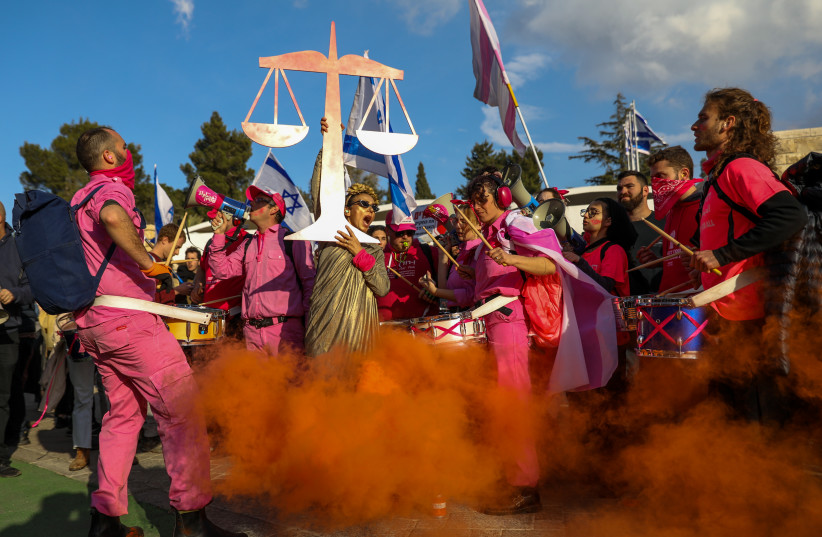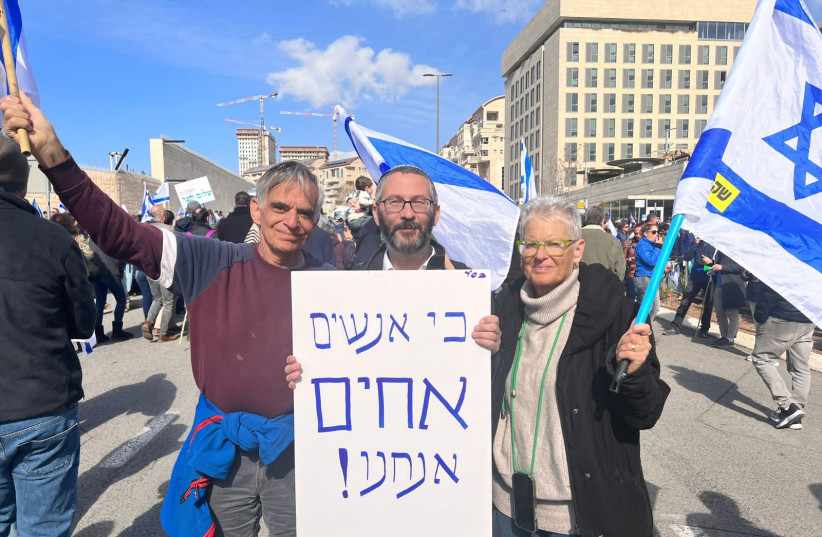Among the tens of thousands of Israelis who flowed to Jerusalem from across the country to protest against the government’s planned judicial reform, were people from all walks of life, all communities, and even all sides of the political spectrum.
At Yitzhak Navon Train Station in Jerusalem, thousands marched their way up the escalators – many of which were out of order – on their way to the Knesset. As soon as they got off the train, protesters began chanting, “Democracy!” and holding up signs with various slogans.
The official protest stretched from the Supreme Court all the way down the street to near the Knesset. Already ahead of the start time, tens of thousands gathered along the entire length of the street, packed together like sardines. That number only grew, making it nearly impossible to move from one end to the other.
Every part of Israeli society could be found in the crowd of thousands. As Monday is a regular workday, all the protesters – from children to the elderly – were missing work or school to express their staunch opposition to the judicial reforms.
Who was involved in the demonstrations?
While representation from the Arab-Israeli sector seemed to be somewhat scarce, Hadash-Ta’al leader Ayman Odeh did make an appearance near the beginning of the protest, and there were a few individuals wearing keffiyehs with some of the pro-Palestinian groups that joined the protests.

Shaltiel, an Israeli who identifies with the right-wing of the political spectrum, told The Jerusalem Post he was protesting out of concern for the negative effects the reforms could have on right-wing Israelis.
“I am worried that the reform will end up hurting the right wing”
“I am worried about a coup,” he said. “I’m a right-wing voter, and I am actually concerned for the right-wing. You know, in another four years, it could be the opposite situation in which the people in charge are the other side, and the other side will come up and say, ‘You right-wingers, get out of here. We’re the majority. We have the 61 [MKs], and the 61 will decide what they decide.’ So I, on the contrary, am worried for the right-wing.”
Shaltiel said he was concerned about how the reforms are being advanced.
“I am disturbed by the fact that the people bringing up the desire to change the system of government are doing so not from pure intentions,” he said. “It’s coming from personal interests such as, ‘I’m going to carry out revenge against the judicial system, because now the Deri Law isn’t acceptable. Deri was declared unfit by the court, so let’s pass a law.’ It’s all tendentious; it’s not for the good of the state.
“I am here for the state and for the good of the state,” Shaltiel said. “We’re here to raise the Israeli flag with pride and to say, ‘We’re here, not for one person or another. We are here for the nation, for democracy, for the people of Israel, for a state in which the checks and balances will be good, and not a case of one body being over the other.’”
The din of loud shouts of “Democracy” and “We will not give up” could be heard throughout the area. Periodically, booing rivaling the shouts raised against Haman on Purim was hurled toward the Knesset, with some protesters even carrying groggers (noisemakers) that are traditionally used to boo Haman during the reading of the Book of Esther.
Shira, a religious Jewish woman from Jerusalem, told the Post every Israeli needed to be there.
“I think every citizen should be here today,” she said. “It doesn’t seem like a special act to come here. It seems like the most natural thing to do today is to be here. We’re very concerned about our state. We live here, we were born here, we raised our kids here, and we have a son in the army. We’re very, very concerned for democracy, for equality, for the liberty of the judiciary, and we need to be here.”
Members of the LGBTQ Olim organization expressed concerns that the government could use judicial reform to take away the rights of LGBTQ+ Israelis that have largely been protected by the court system.
“We’re very worried about the future of the country, the future of democracy in this country,” a representative of the organization said. “The changes that the government is trying to bring in, changes to the Supreme Court, are very disturbing... It gives the majority way too much power. A lot of our rights have come through the Supreme Court, and with a weakened Supreme Court, those could be overridden.
“We're supposed to be a light unto other nations, but we're worried that that light is starting to dim.”
“They’re talking about changing the Law of Return to make it more restrictive. As queer olim [immigrants], we’re concerned about where that can go. There are people who make aliyah with non-Jewish partners, and changes to the Law of Return could prevent them from making aliyah. Marriages could be overridden; adoption rights, surrogacy rights [could be at risk]. We’re very concerned about what could happen. We’ve seen what’s happened in other countries... We’re supposed to be a light unto other nations, but we’re worried that that light is starting to dim.”
A group of Jerusalem yeshiva students came to the protest and spoke to those who approached them about why they supported the government and its efforts concerning the judicial system.
While some of the people who approached the teenage students yelled at them and even shoved flags in their faces, the students responded by calmly explaining their position and even agreeing on some points with those arguing with them.
Avishai, one of the students, said while he supports the government and the reforms, he “came to hear the other side, to present what I think and leave with food for thought to figure out what I really think.”
While leaving the protest, some protesters encountered Ya'akov Neuman, who came with his family, not specifically to express opposition, but rather to stress the need for unity among the people of Israel.

“We’re not in favor of this protest, we’re not in favor of other protests, we’re in favor of change in the system of government, especially changes in the judicial system,” he said. “But above everything, above everything, we’re in favor of the people of Israel. Because of this we came here. We’re all brothers.”
